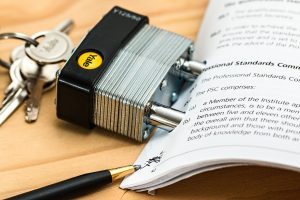 Around 15 million people in the U.S. have their identities used fraudulently each year. In fact, every minute, about 19 people fall victim to identity theft and it takes the average victim an estimated $500 and at least 30 hours to resolve each theft crime.
Around 15 million people in the U.S. have their identities used fraudulently each year. In fact, every minute, about 19 people fall victim to identity theft and it takes the average victim an estimated $500 and at least 30 hours to resolve each theft crime.
Identity theft can not only mess up your credit and reputation, but it’ is a serious issue that can have a huge impact on your finances. Having your identity stolen can put you in debt and cost you additional money to fix the issue. It’s a dreaded hassle that no one wants to deal with.
Nevertheless, you could very well be putting yourself at risk to becoming the next victim of identity theft each and every day. Here are a few ways you can avoid becoming a victim of identity theft.
Check Your Credit Report
Your credit report is a great tool to help you know and track your score, but it can also help you detect possible identity theft. Identity theft can practically ruin your credit score and give you major problems when you apply for a loan or credit card.
It’s important to monitor your report regularly so you can dispute any fraudulent activity or incorrect information. Sometimes, innocent mistakes may appear on your credit report. Other times, more sinister activity can be occurring and someone who has your information can be buying things and taking out loans in your name and at your expense.
It’s best to report identity theft early and stay on top of your own records. You can check your credit report for free annually at AnnualCreditReport.com. This site will display the most accurate information so you can be fully informed about your credit file.
Shred Unwanted Documents
Shredding documents, is much more important than people make it out to be. Identity thieves make it a habit to look through trash and old documents and receipts they find laying around.
It’s up to you to protect your documents with important private information from getting into the wrong hands. The best way to keep your information safe would be to store all your important information in a filing cabinet or folder that you can easily access.
Realistically, there will be some papers that you need to trash. For the sake of decluttering and keeping organized, you might want to pitch old receipts, duplicated bank statements (if you are utilizing a paperless option) and bills and documents from several years ago that are no longer relevant.
To trash these items safely, you should shred them first so even if someone comes across the tiny scraps of paper later, they won’t be able to read it or piece it back together. Investing in a ordinary paper shredder and using it weekly before you empty your trash will do the trick.
Keep Important Information out of Your Wallet
Your wallet can be a treasure trove for thieves if they ever get a hold of it. This is why you should be careful wit keeping extremely personal information inside of it even if you’re unlikely to lose your wallet or leave it somewhere. It’s not uncommon to drop your wallet in a rush, leave it behind somewhere or even have it stolen.
If you lose your wallet, some people will be nice and return it, but others may not. Why take that chance?
While you have to have important items in your wallet like your ID and debit/credit cards, you should not have things like your social security card, passport, bank account and routing numbers, or password sheets in your wallet. You can always shut down your debit or credit cards if you lose them but it’s more of a hassle to report your social security card lost or stolen.
Protect Yourself Online
When you’re online, try to avoid doing any online banking, shopping or typing in any passwords when you’re using an unsecured WiFi network. These days, it is way too easy intercept unsecured WiFi communications and steal people’s information.
Create strong passwords when you sign up for accounts and memberships online and download reliable anti-virus and anti-malware software. Also, beware of phishing scams and spam emails where people send out fake messages requesting personal information from you or ask you to open a document that could contain a virus.
Other Ways to Avoid Identity Theft Include:
- Pick up your new checkbook instead of having it delivered to your home
- Protect your pin number when you are making transactions in public
- Be careful with giving out personal information over the phone
- Store passwords for accounts in a safe place
Remember, You Can Help Protect Yourself
It’s unfortunate, but anyone can steal your identity whether you know the person or not so it’s best to protect yourself with these tips and techniques. Remember to monitor your credit report regularly, be aware of your surroundings and keep your personal information out of others’ reach. By being alert and cautious, you can prevent identity theft from happening to you.
Chonce is a freelance writer who’s obsessed with frugality and passionate about helping others increase their savings rate, eliminate debt, and work toward financial stability. She chronicles her journey to becoming debt-free on her blog, mydebtepiphany.com.